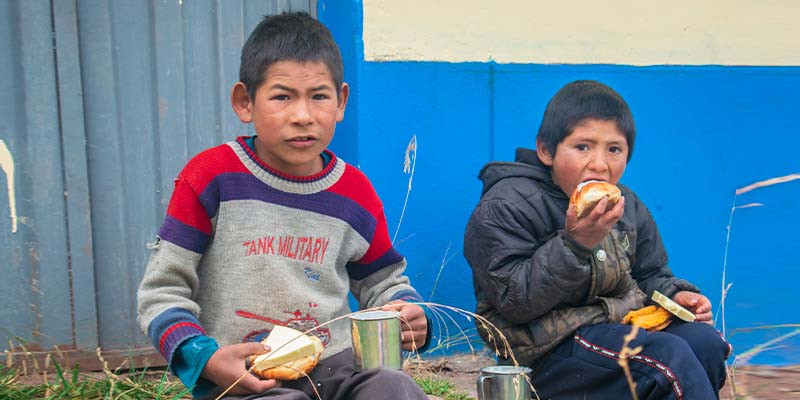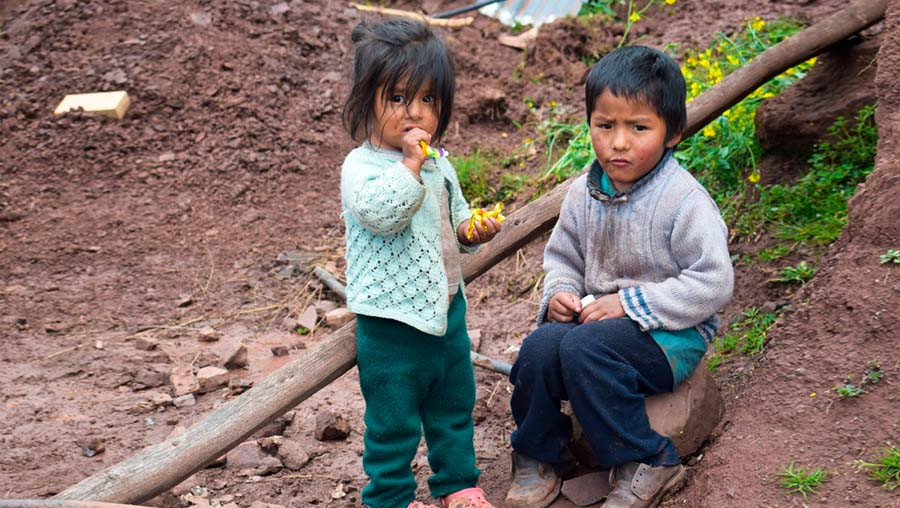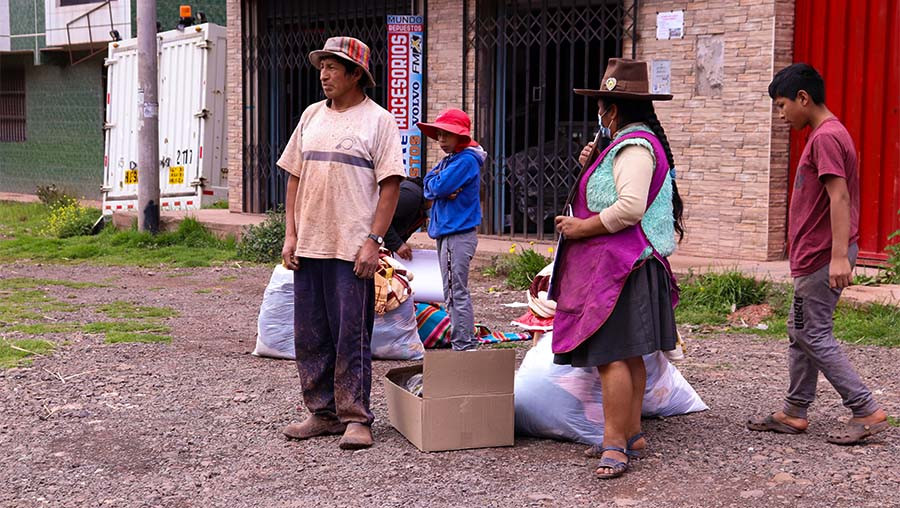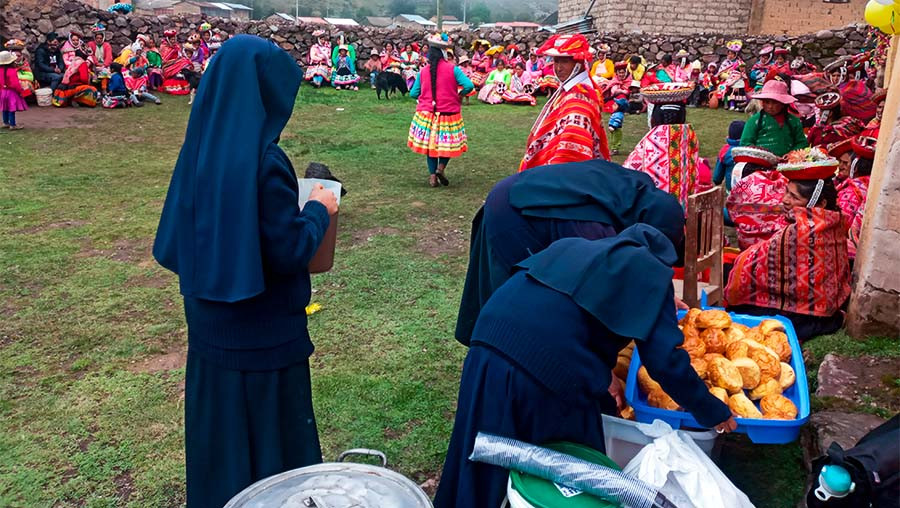“Being rich, he became poor for us”
JAN 21, 2022
Dcn. Guido Anthony Huaman Huillca, msp (Peruvian)
I will begin with the words of Saint Paul, “For you know the gracious act of our Lord Jesus Christ, that for your sake be became poor although he was rich, so that by his poverty you might become rich” (2Cor 8:9). The Apostle was speaking to the Christians in Corinth to encourage them to be generous and to help the faithful in Jerusalem who were needy.
But we have to start with the grace of Christ as Scripture says. Because you know the grace of our Lord Jesus Christ, Saint Paul teaches a model, the best example, where he gives a lesson of what to give by grace, knowing that Christ doesn’t reveal himself through power and riches but through weakness and poverty. For love he became poor. The expression “was made poor” comes from the Greek “ptojeúo” which means “to be a beggar, indigent and figuratively, to be made poor.” It’s in this context that Saint Paul explains how Christ humbled himself, divested himself, having all power, authority, sovereignty, glory, honor, and majesty, He left His place with God and, in obedience to the Father took the form of a man, dying on the cross in a horrible manner to take the place we merited so that we with His poverty were enriched. The riches that Saint Paul teaches here has nothing to do with the material but speaks of spiritual riches and blessings. He speaks of being rich with salvation, pardon, joy, peace, glory, and honor. He talks about being co-heirs with Christ.
What a great mystery is the incarnation of God! The reason for this is divine love, a love that is grace and that doesn’t hesitate in giving Himself and sacrificing Himself for the creatures He loves. Jesus doesn’t make Himself poor to be poor, says Saint Paul, but “to enrich you by His poverty.”
What, then, is the poverty with which Jesus frees us and enriches us?
The poverty of Christ with which He enriches us consists in the fact that he became flesh, burdened with our weaknesses and our sins, teaching us about the infinite mercy of God. The poverty of Christ is the greatest treasure. The treasure of Jesus is unlimited trust in God the Father, it is in commending Himself to God at each moment, always seeking His will and glory alone.
The treasure of Jesus is rooted in His being the Son. His unique relation to the Father is the sovereign prerogative of this poor Messiah. When Jesus invites us to take upon us His “light yoke,” he invites us to enrich ourselves with this “rich poverty.”
God became a child among us, embracing the poverty of His parents and rejecting the riches and power of men. To be a small child in the arms of the two most beloved persons in all creation, Joseph and Mary, is a great treasure, a beautiful and loving family, the most precious treasure that a person can have. On that night in Bethlehem, the mystery of the love of God become flesh in Jesus, the tenderness of a child and the celestial omnipotence became one in the person of the Son of God.

Material misery is what we usually call poverty and affects whoever lives in that condition which isn’t worthy of the human person who is deprived of their fundamental rights and necessary goods like food, water, health, work, and the chance to advance. Faced with this misery, the Church offers its service through its missionaries to respond to the needs and heal the wounds that disfigure the faces of the poor. We see the face of Christ in the poor. By loving and helping the poor we love and serve Christ.
When power, luxury, and money become idols, they oppose the just distribution of wealth. Consciences must be converted to true justice, equality, sobriety, and sharing.
No less important is moral misery which turns people into slaves of sin. How many people live in anguish because one of its members, frequently a teenager, is addicted to alcohol, drugs, gambling, or pornography! How many people have lost meaning in life and hope in the future! All this because they haven’t discovered the great love that God has for them. They haven’t experienced that infinite love and mercy that God has for his children. Such a love it is that He didn’t mind leaving His glory to come and rescue us from death.
This form of misery always accompanies spiritual misery which afflicts us when we distance ourselves from God and reject His love. If we think we don’t need God, Who in Christ reaches out His hand to us, because we think that we can take care of ourselves, we put ourselves on a road to disaster. God is the only One Who truly saves and frees us.
We Missionary Servants of the Poor seek to follow the example of Christ by repairing this spiritual misery which is so prevalent in the world. We are among the poor so that they may learn that Christ came for them especially and to teach them also that Christ was poor like us. So the Missionary Servant of the Poor must be a witness to the resurrection. This means not avoiding the cross like many think, but to the contrary, embracing the cross, not as a burden but as the bridge that leads us to Wisdom, as the Imitation of Christ (our rule) says, “he is truly wise who does the will of God, and not his own.” Carrying the cross doesn’t mean sadness but joy, knowing that in it is my salvation. “Christ’s whole life was cross and martyrdom and, you seek for rest and pleasure? You are wrong if you seek anything but suffering for Christ” (Imitation of Christ).
The Servants of the Poor fully embrace the teaching of the Church and we are convinced that the material lack of the poor is a consequence of their spiritual misery so we try to increase the presence of Christ in the Eucharist among the poor and at the same time transform ourselves into shared bread among them. We Servants of the Poor know that the greatest poverty and misery isn’t the lack of material goods but the lack of the knowledge of Christ.
Poverty has its roots in sin and the solution is for Christ to reign in our hearts, that is, first transform our own hearts so that we may be able to change the hearts of others.
We are all poor and the poorest among the poor are those who don’t know God. The true Christian is he who surrenders to the will of God unconditionally. The most accomplished model of poverty is Mary when she says, “Behold the handmaid of the Lord, be it done to me according to your word” (Lk 1:38). Detachment and abandonment are the wings of every Christian with which one flies to God, so our concern is to give glory to the Lord Jesus.
We should all ask ourselves how we can make room for poverty in our life. First, helping the poor to relieve their enforced poverty, poverty which destroys them. Second, loving the poor which is a virtue that helps us to detach ourselves from the materials goods so they don’t take over our souls.
Jesus had a special love for the poor whom He praised in the Sermon on the Mount and in His Parable of the Final Judgment to the point that He said our salvation depends on loving and sharing with the poor and needy.
The follower of Christ, the Christian, is called to be poor in spirit as a condition of true discipleship. Poverty of spirit implies a rejection of material things, a simple style of living, and solidarity with the poor. It implies, furthermore, the grace of recognizing Jesus in the poor, those that suffer and those abandoned because of injustice, violence, and hate. The Catechism of the Catholic Church tell us, “Our Lord warns us that we will be separated from Him if we fail to help the grave needs of the poor and the little ones who are his brothers” (CCC 1033).
You sometimes hear it said that the treasure of the Church are the poor. “It will not be Saint Peter who opens the doors of heaven to you. It will be Jesus present in the poor whom you helped.” We all know the words of Jesus, “I was hungry and you gave me to eat, thirsty and you gave me to drink. And they will ask Him, But when, Lord, did we see you hungry or thirsty and we helped you? And He will answer, ‘I assure you that what you did for the least of my brothers you do for me’” (Mt 25:34-40).








